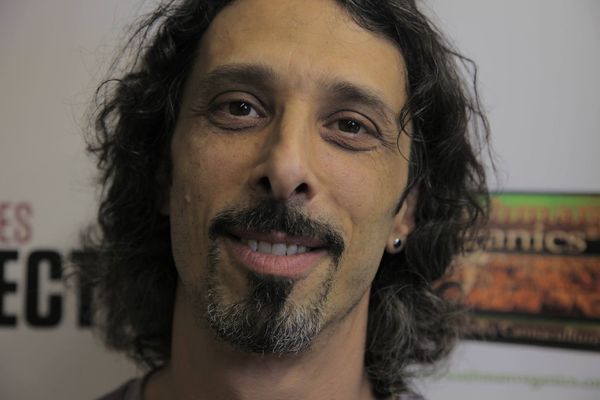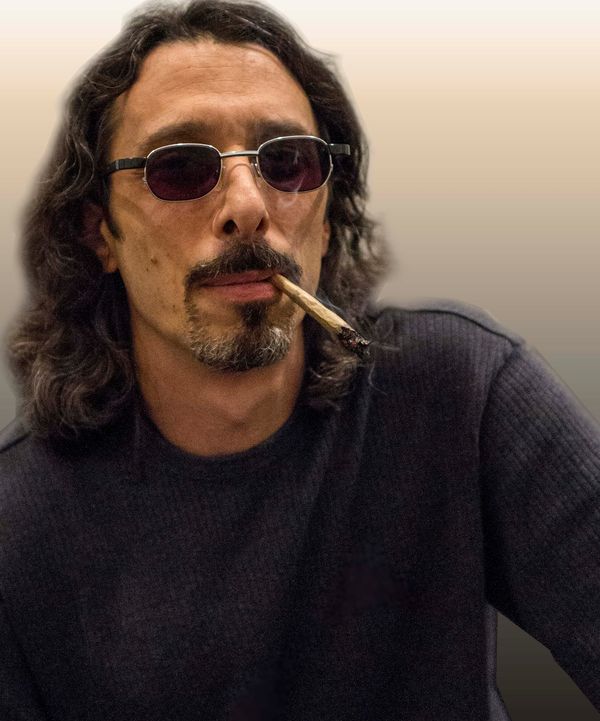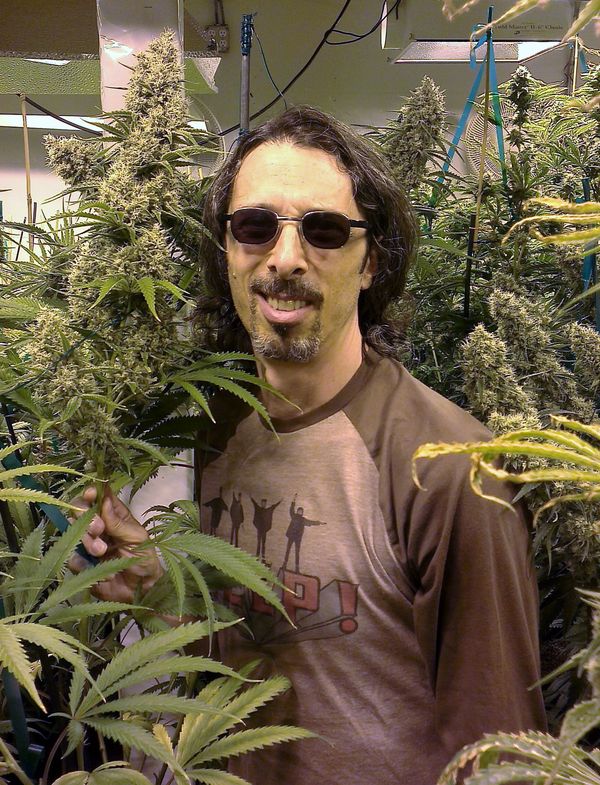- Kyle Kushman is the pseudonym of Adam Orenstein, a famous cannabis breeder who specialises in organic and veganic growing. This California-based legalisation activist has been growing cannabis since the age of 21 and has made a career out of the herb. He now markets vegan nutrients and gives tuition on the techniques involved as well as lectures on the need of deregulating home growing.

Known for his organic and vegan cultivation techniques (a type of ecological growing that does not use animal products) Kyle Kushman has been a cannabis user since his teens. A US citizen, he has been writing for ‘High Times’ magazine for 20 years and has become a fervent activist for the legalisation of cannabis and the right to deregulated home growing, which entails the suppression of those rules that control this economic activity, in the interests of free competition.
Kyle Kushman is now going to relaunch his website and give online classes in collaboration with Oaksterdam University, an institution in his country known as the cannabis college, where classes are given on, among other things, law and horticulture. Kushman, who has more than a dozen Cannabis Cup awards for his different cannabis strains, talks to us about his relationship with marijuana and its background, about the situation of legalisation in the United States and about his recent visit to the Spannabis fair in Barcelona, which deeply impressed him.
How did you enter the world of cannabis growing?
I’ll be quite honest. As a joke, I usually refer to myself as a “glorified teenage pot dealer”. When I was young, I was always selling and smoking marijuana. When I turned 21, I moved house and my dealer at the time told me that, if I let him use my wardrobe, he’d teach me how to grow the stuff. At the time, I’d never even considered the possibility of home growing. When he asked me to do that, I started to analyse it in my head and realized that I didn’t even know how cannabis actually made it into the bag. I didn’t know if it grew underground or on trees like almonds, I didn’t visualise it.
The next day, he brought in the equipment, a small Emily's Garden, which is still being sold, and he gave me a tube with green powder and another one with blue powder. He then told me: “Put in a spoonful of this during the growing process and a spoonful of that when it flowers. Here are some pH indicator strips”. The first plants I grew were the size of Coca-Cola cans. And I said to myself: “My life will never be the same again”.
How have your cultivation and breeding evolved since then?
It’s been a long way. We’re talking about over 25 years; I’m going to turn 50. Once I started growing cannabis, I never stopped. At the time it was really, really illegal. In fact, it wasn’t legal anywhere. I risked doing ten years’ time if I got caught. So I basically spent eight years moving house every 6 or 9 months.
I once lived in Upstate New York and there was 18 inches of snow on the ground and the roofs. I was once going home, I was parking and I saw there was no snow on my roof. I was growing in the attic and the heat of the lamps was melting it. When I looked around and saw there was snow on all the other roofs, I told my girlfriend: “We’ve got to move out, this is making me nervous”. And that’s the way it was for years, we were constantly moving. I never made that much money. I always thought that, if I ever got caught, I’d try to convince the judge and the jury that I was doing it for myself and my friends and had no intention to get rich on that.
Were you ever arrested?
I actually got busted a couple of times. In both cases, I was spared going to prison. The first time, it was because the search had been illegal. My second arrest, believe it or not, was in Northern California, in 2010. I thought I was doing everything all right, but as it was me, Kyle Kushman, they came and arrested me. After a year of struggling in the courts, I was finally made to go on parole for 18 months. Cultivation was a very great challenge all those years.
At what point did cannabis become the basis of your career?
I was in New York when I went into a headshop, where they sell paper and pies. The owner asked me if he could close the door during the break and smoke a joint. I said it was no problem and took out my own cannabis, a very large bag. He couldn’t believe it and asked me where I’d got it from. I told him I grew it myself, that this is what I did. His girlfriend knew people from ‘High Times’ and they offered to introduce me to them.
What’s your relationship with ‘High Times’ been like since then?
‘High Times’ paid me a visit at home and did several photo reports. Eventually, I became very close friends with the staff and basically became their distributor. Whenever I went to the city, I’d go to their offices and the receptionist, on the interphone, would say: “Kushman’s here, Kushman’s here”, because I sold them Purple Kush. They finally offered me to write for the magazine.
After a while, they offered me a “high-prestige, low-paid job”: ‘High Times’ was starting its website and they offered me to be in charge of answering questions on cannabis. So there I was, working for an international magazine. It became my way of finishing school: I learned how to write and how to express myself. And as people say, the rest is history.
Your cannabis has won several awards. What makes it so special?
Well… there are many great breeders and I’m one of them. I’d say the vegan cultivation system has a lot to do with it, as does my attention to detail: I’m very specific and perfect my techniques a lot. But what really matters is that I cultivate out of love for marijuana. I called cannabis my medicine long before anyone called it medicine.
It’s usually said that people start out with cannabis and go on to other things. But it was different in my case. I gave up cocaine for cannabis and that was a great change in my life. I said to myself: “If I stick to cannabis abuse, I’ll be all right”. And not only was I all right, I actually made a career out of it. So I’m passionate about marijuana as medicine and for recreation, in all of its forms.

Regarding legalisation, what’s your opinion? Do you think it will soon become a reality?
It’s already happening. 25 states out of 50 have already legalised medicinal or recreational marijuana. There’s no way to stop legalisation. And the main reason for this is that it’s the right thing; cannabis shouldn’t be illegal. It’ll be legal when people are ready, and society is growing up, they’re no longer scared about the old myths. The problem now lies in deciding how to control the profits, the money. It’s all about that now.
To me, in a way, it’s great because we’ve finally come to the point that people believe it’s an ordinary commercial product that must be regulated. But also makes me sad to think that we’re paying so much attention to legalising it commercially and we’re giving people the right to grow it, but only if they can afford the licence. These licences can cost millions of dollars and then they authorize you to cultivate in fields the size of football stadiums and makes millions more with that.
Is the solution a matter of deregulation?
If you’re somebody like me, you can only grow six plants. And this is no good because I can’t do any breeding, I can’t do experiments with different strains. Legalising cannabis for merely commercial reasons is going to deter all of these experiments and the growing by people who do it because they have a sick grandmother or aunt, because somebody’s got a wife with fibromyalgia or because they themselves don’t want to drink.
I cultivate for four people; I can’t make do with six plants. I need a hundred. That’s what I’m fighting for now and, especially, that’s why I’m giving lectures. Personal marijuana can be no more regulated than my tomato patch. Whatever it is I want to do at home is my business and nobody else’s. If we want to put an end to the black market, we’ve got to deregulate home growing. I don’t want it to be in the hands of businesses but of people like me, who’ve got passion and cultivate out of love for the plant.

So what is it they’re getting wrong when it comes to creating new laws?
There’s a great lack of connection between the cannabis culture and the people who try to make the laws. The people who’re trying to legislate fail to understand that cannabis has always been and will always be a self-administered substance. Even when a doctor prescribes it, you’re not told how many joints you’ve got to smoke or the variety you’ve got to use; you’re told to try to find the variety that suits you best and try it out. Whenever you ask a patient, the effects are thoroughly personal. And they don’t get that.
Another thing they don’t see is that cannabis is just the second substance in history that’s been socially accepted for recreational purposes. There are many other things like cocaine or ecstasy that are used for recreation. But cannabis is accepted. If you smoke on the balcony of a friend’s house, people don’t get scared. They may or may not approve of that. But it’s accepted. And they don’t understand this either. Only now are they beginning to understand that it’s a medicine. And obviously, from their point of view, medicine shouldn’t be used recreationally. But marijuana is a recreational substance.
They also say they don’t want to see people smoking in the streets and bars, but it’s actually already happening. They already cohabitate with cannabis users, but the latter are closeted. They won’t be supporting a new habit but bringing it out into the open.
You’ve recently come to Spain to participate in Spannabis 2016. What was it like and what impression did you get of the situation of marijuana in our country?
Barcelona is the prettiest city I’ve ever visited. I was really impressed with how vibrant it was, how well it worked. I was even struck by the traffic lanes and their being separate; one for taxis and buses, one for cars, another one for bicycles. People looked healthy, happy and willing to help. I can’t wait to get back. The show itself was great; people were very kind and open. There weren’t all those silly little rules about not smoking in public. Everybody smoked at the conference. It wasn’t legal, but the cops chose to… “Leave them alone”. I was really very impressed.
What do you think of autoflowering seeds?
I’ve got a strong opinion about that and it’s sort of 50/50. I understand it in part; I understand the reasons and advantages; it allows people to use less space and saves them from having to worry about males or females. But on the negative side, we’re weakening the gene pool: they’re great for growing but not for breeding, because it can have bad effects. I’d advise people not to do any breeding with autoflowering seeds.
Finally, what is your favourite cannabis strain?
Without a doubt, Strawberry Cough, ever since I discovered it twenty years ago. I call it the queen of the jungle. People have often thanked me because it helps them with fibromyalgia, arthritis… In my case, it inspires me. Strawberry Cough gives you the motivation for what you want to do.



Comments from our readers
There are no comments yet. Would you like to be the first?
Leave a comment!Did you like this post?
Your opinion about our seeds is very important to us and can help other users a lot (your email address won't be made public).